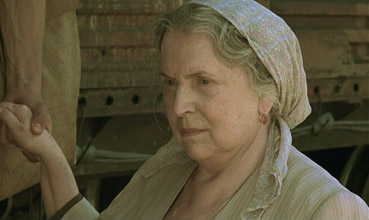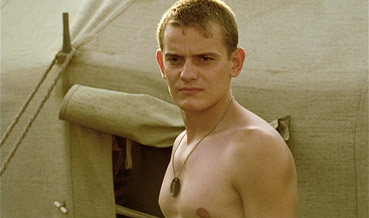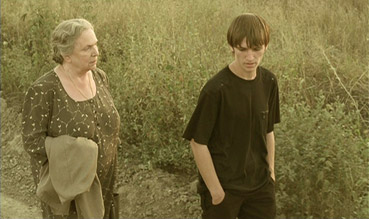|
Alexandr Sokurov makes the sort of films that those who like their viewing driven by story and incident tend to describe as difficult. But then, telling stories in the traditional sense is not what Sokurov films are about, at least the ones I've been lucky enough to see. With the possible exception of Russian Ark [Russkiy kovcheg] (2002), an ambitious and captivating but challenging trip through Russian history, realised in a single 95-minute steadicam trip through the St. Petersberg State Hermitage Museum, they try to capture the essence of an experience by focusing on the detail of and around it. The 1997 Mother and Son [Mat i syn], for example, consists of nothing more than a man comforting his dying mother in an isolated forest house and attempting to come to terms with her passing, yet it's a mesmerising and deeply moving audio-visual experience. Similarly The Sun explored Emperor Hirohito's transformation from God to man at the conclusion of WW2 in purely subjective fashion, focussing on Hirohito's emotional journey rather than the facts and faces of the event.

Like these films, Alexandra is unlikely to hook on the strength of its storyline alone. Alexandra herself (actually Aleksandra, in line with the Russian spelling of the title) is an ageing grandmother who at the film's start boards a military train bound for a Russian army camp in Chechnya. It emerges that she's visiting her grandson Denis, an officer at the camp, who she has not seen for seven years. (I have to admit to being surprised that any civilian, let alone someone of her physical frailty, would be granted visiting rights to an army camp in an area of potential conflict, but I'm assuming this is down to cultural difference on such matters.) Once installed and reunited with Denis, Aleksandra takes to exploring her surroundings, meeting other soldiers and even walking down to the local market, where she is shunned by younger stallholders but is befriended by local woman of similar age. Save for the ending, that's the gist of the storyline. But, as ever with Sokurov, it's all in the detail.
Alexandra is a film about age, the modern military experience, and the bonds that exist within and between those of different generations, and Aleksandra acts as our guide to all three. Her journey to the camp is a small adventure in itself, conveyed as she is in vehicles shaped specifically for the young and able-bodied, military transport that she requires considerable assistance from others simply to board or alight from. It's a design factor that had never occurred to me until I watched her being painstakingly manoeuvred by a whole gang of soldiers into an armoured troop carrier that these far younger men are able to easily vault into. Equally surprising are the soldiers themselves, who are respectful and courteous to a man of Aleksandra's presence, though as curious of her as she clearly is of them. Of course there's no reason whatsoever why they should not behave so, it's just a side of the professional soldier you rarely see portrayed on screen.
Once Aleksandra has settled in to her new surroundings, her curiosity takes her on slow walks around the camp, where she is often observed but rarely challenged. Those who do so are quickly dismissed, their administered authority shrugged off by a woman who has earned hers through age. This is typified on her second night in camp, when she wanders through the darkness like the ghost of a past resident and approaches a guard post at the edge of a mine field. "You're not allowed to be here," admonishes one of the young sentries. "I'm not asking your opinion" she wearily relies and perches herself on a stool, where she shares food with her new companions and ends up spending the night.

The soldiers' respect and even affection for Aleksandra is most evident when they scurry around to improvise a dining table and meal and watch her intently as she eats (one even pushes another away so that he can continue to do so), while individual curiosity peaks in an unexpectedly moving sequence where a soldier secretly spies on and is captivated by a night-time conversation between Aleksandra and Denis, which culminates in Denis lovingly brushing and platting his grandmother's hair. It's left to us to provide our own explanations for the soldiers' behaviour towards their visitor, which goes beyond simple curiosity and can't help but suggest the emergence of a previously suppressed yearning for home and family life that they have become emotionally distanced from. When Aleksandra agrees to buy cigarettes and biscuits for the sentries on her trip into town, she seems almost like a mother nipping out to the shops for her family.
It's fair to say that some of the statements made in the film are more direct than usual for Sokurov. That they are points worth making is not in question, but having Aleksandra handle a rifle, take aim, pull the trigger and say "It's so easy," or tell soldiers that "shooting is all you know how to do" does feel a little obvious and simplistic. But even her more direct enquiries sometimes throw up enlightening detail, about the routine of life for a professional soldier or the increasingly ageing equipment they appear rely on, a sly comment perhaps on how the conflict has slipped down the ladder of importance in the eyes of those running the Russian military show.
Alexandra is definitely at its strongest when the message is allowed to emerge organically or is left to us to interpret. Thus while it's no surprise that Aleksandra gets a taste of local hostility to the soldiers' presence on her trip to the market, the discovery is handled in effectively low key manner through a silent refusal to respond to her language and dialect, or the judgemental glances and suppressed hostility of the district's younger male inhabitants, a possible next generation of guerrilla fighters in the making. Similarly, the friendship she strikes up with local stallholder Malika feels in no way contrived, two older women whose common ground easily transcends the ethnic barriers that seem to divide their grandchildren. An unforced commentary on the conflict is provided by the alarming structural condition of the apartment blocks in which Malika and her neighbours live, where washing is hung out just feet from artilery damage that looks serious enough to threaten the building's collapse. It's in the kindly face and disposition of neighbour's son Ilyas, who walks Aleksandra back to the camp and is known to the soldiers by name, that a more reconciliatory future for both sides may lie.

The film's ability to consistently hold the attention is down, as ever, to Sokurov's handling, particularly his use of close-up as a weapon of choice, connecting us with the curiosity, longing and uncertainty of his characters with the bare minimum of spoken exposition. Aleksandra herself (played by widely respected stage actress and opera singer Galina Vishnevskaya with an unforced naturalism that never feels performed) is the prime focus for Aleksandr Burov's camera, which observes her from the viewpoint of others and moves with her in silkily smooth tracking shots, intermittently switching to her point of view and going wide to include others or the surrounding landscape.
But an exploration of the component parts still fails to explain just why the film exerts such a grip. It's not even that it grows on you – I found myself strangely hooked from the opening scene, sympathetic to Aleksandra's every groan of age-related discomfort and as curious as she about the lives of the soldiers she observes and makes reluctant conversation with. It is, as some have observed, less an exploration of its themes than a meditation on them, but one that connects us to its characters on a very personal level in a manner that makes for disarmingly compulsive viewing.
Sokurov rarely presents his imagery exactly as filmed, with the colour palette in particular usually altered in some way. Alexandra is no exception, with prime colours muted and the whole image given a strong sepia tinge, resulting in a narrower contrast range that also affects the solidity of the black levels, though in a way that always feels in keeping with the chosen look. Within that restriction the image quality is excellent, with crisp detail and no digital issues even in darker scenes. The daytime exteriors are close to immaculate. Even at night there are no major digital issues. The image is framed 1.66:1 and anamorphically enhanced.
The standard Artificial Eye duo of Dolby stereo 2.0 and Dolby 5.1 surround are on offer. Both are very clear with distinct separation (a passing helicopter moves across the front sound stage), with the 5.1 making use of the surrounds for specific effects and location ambient sound.
Interview with Alexandr Sokurov (14:46)
Director Sokurov talks about the film's literature origins, working with lead actress Galina Vishnevskaya (the script was written especially for her), and intriguingly compares the filmmaking process to the growing of a tree. The majority of the conversation, however, is occupied by his views on the immorality of war and the impossibility of reconciling large loss of life with claims of victory.
Interview with Andrei Sigle (8:26)
The film's producer, who also composed the melancholic score, provides some interesting insights into the making of the first film to be shot on Chechen soil for ten years. There's some eye-opening stuff here, particularly the precautions that had to be taken to protect the cast and crew from harm (travelling in armoured cars, not staying in one area too long, buying multiple plane tickets for Vishnevskaya to disguise her actual points of departure and landing). Heartening to know that the producer's top priority was that "everybody came back alive."
Trailer (3:59)
A long and rather formless trailer that nonetheless captures a flavour of the film rather well.
Sokurov Filmography
As it says, no frills.
Gallery (1:39)
A rolling gallery of production stills with the Ken Burns effect.
Once again Sokurov has created compelling cinema from a situation rather than a story per se, one that explores differences of generation and attitude and a military experience that is in no way tied to its location, although in his interview producer Andrei Sigle suggests that the film is seen very differently by a Russian audience, who are likely to have very specific views on the conflict in Chechnya, than an international one. Those who expect to see their movie soldiers in action need not apply. A first rate transfer and some OK extras make the Artificial Eye disc a most worthwhile purchase.
|